外研七上Module 4 Healthy food 课时重点归纳与跟踪练习
文档属性
| 名称 | 外研七上Module 4 Healthy food 课时重点归纳与跟踪练习 | 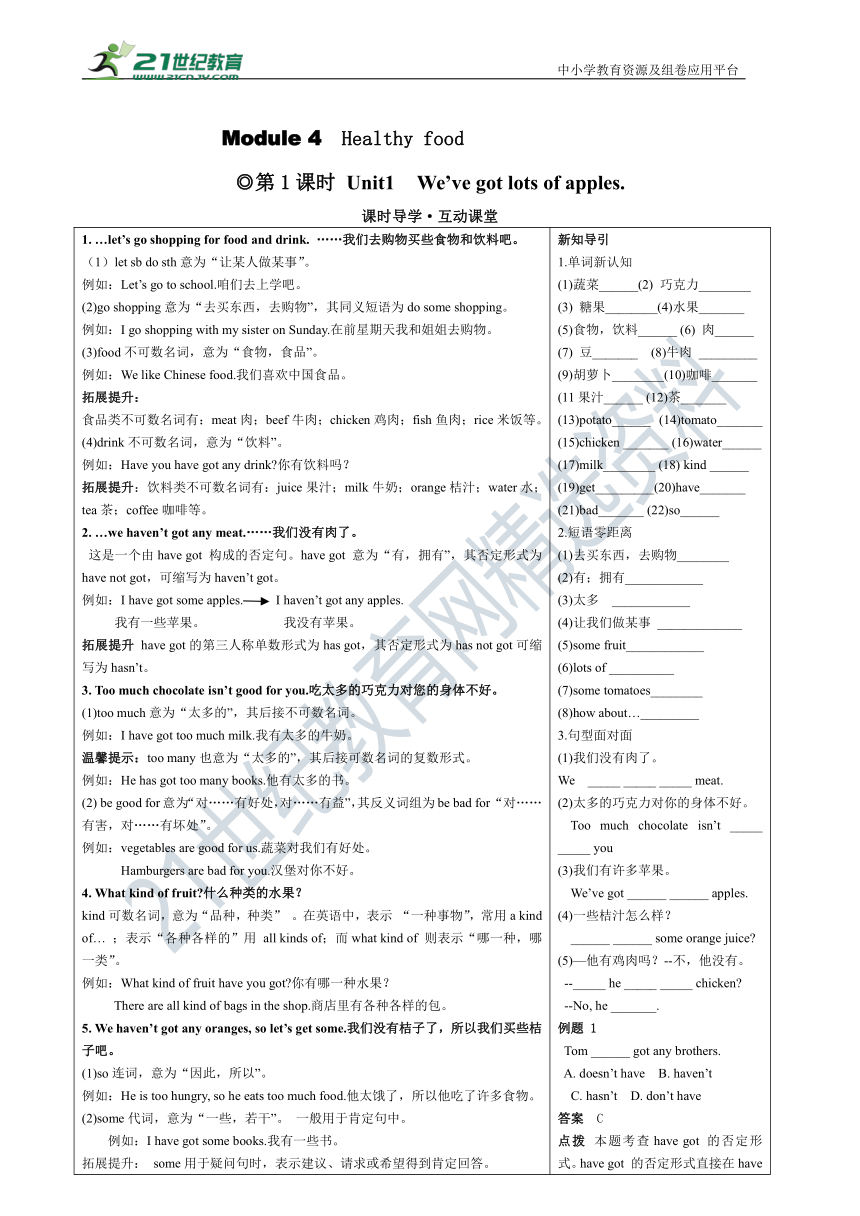 | |
| 格式 | zip | ||
| 文件大小 | 1.4MB | ||
| 资源类型 | 试卷 | ||
| 版本资源 | 外研版 | ||
| 科目 | 英语 | ||
| 更新时间 | 2018-10-21 07:18:53 | ||
图片预览

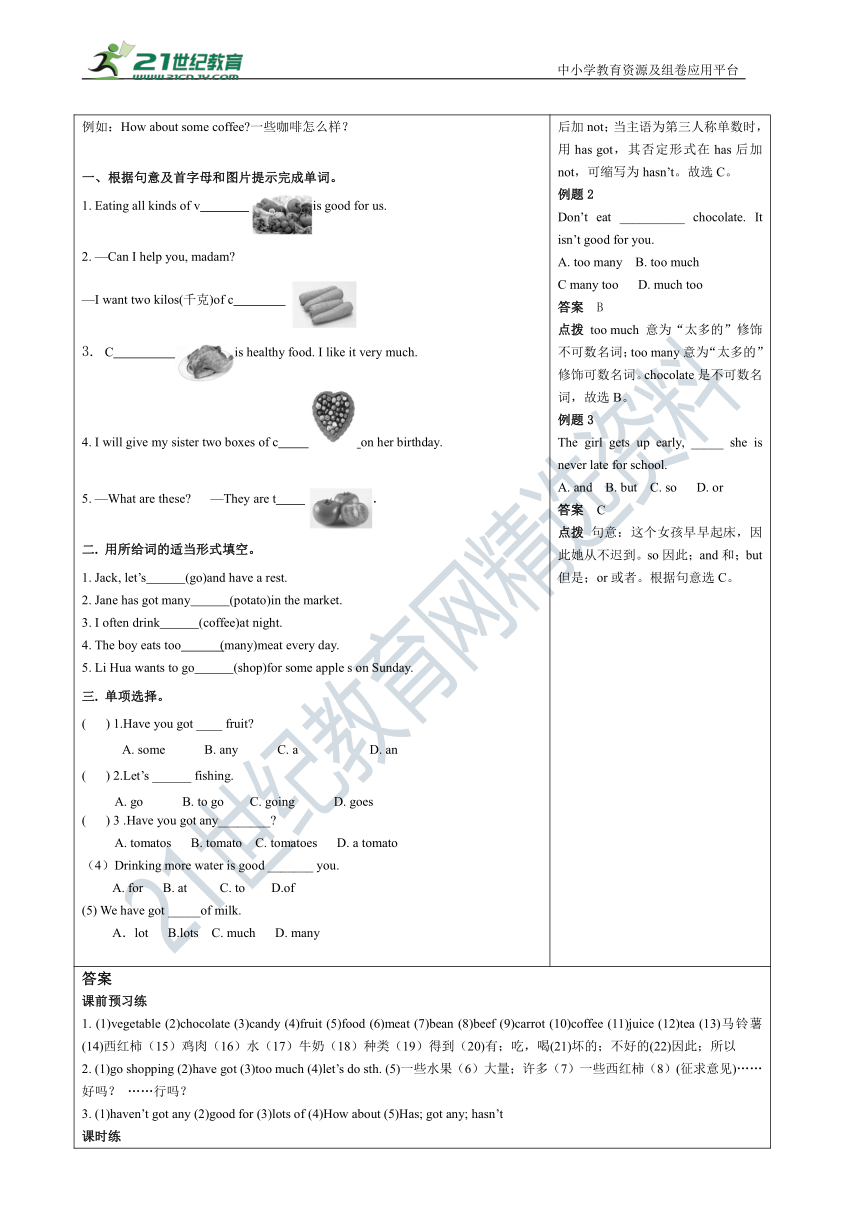
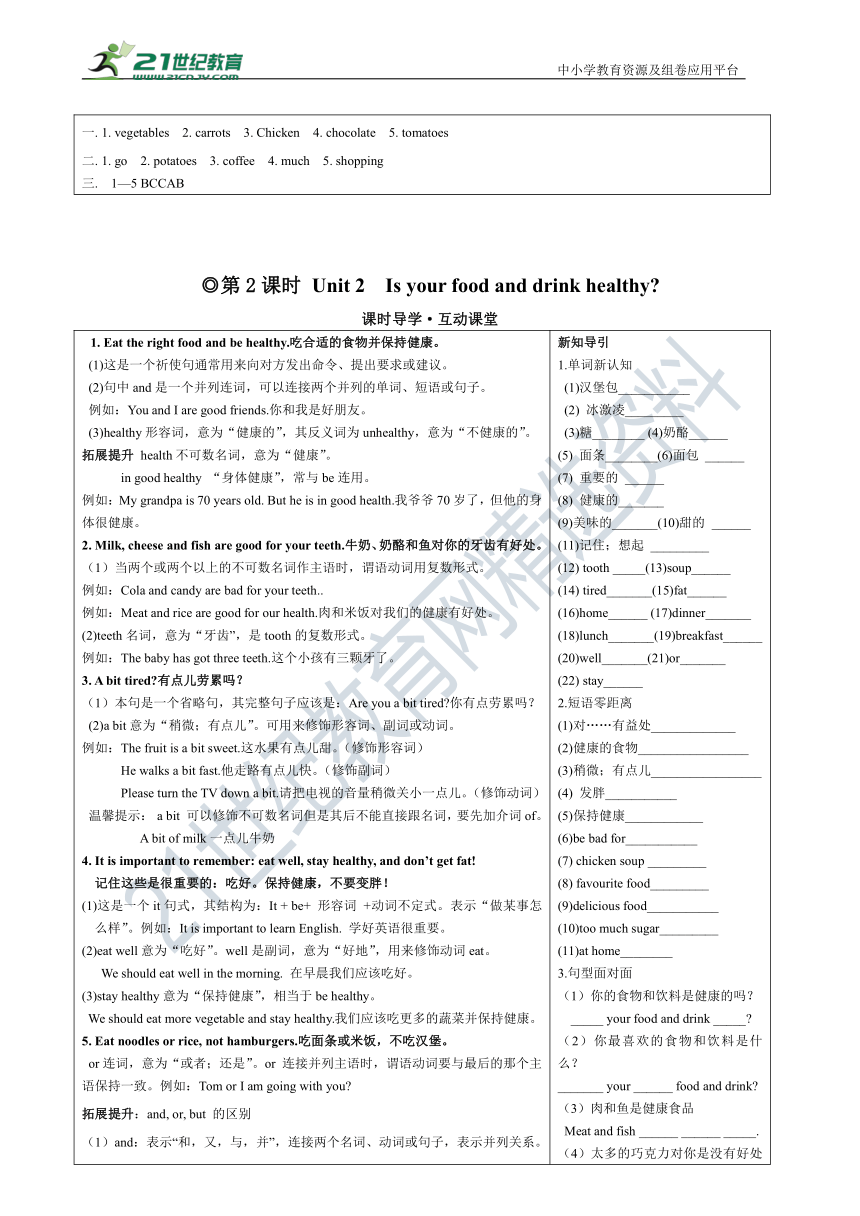
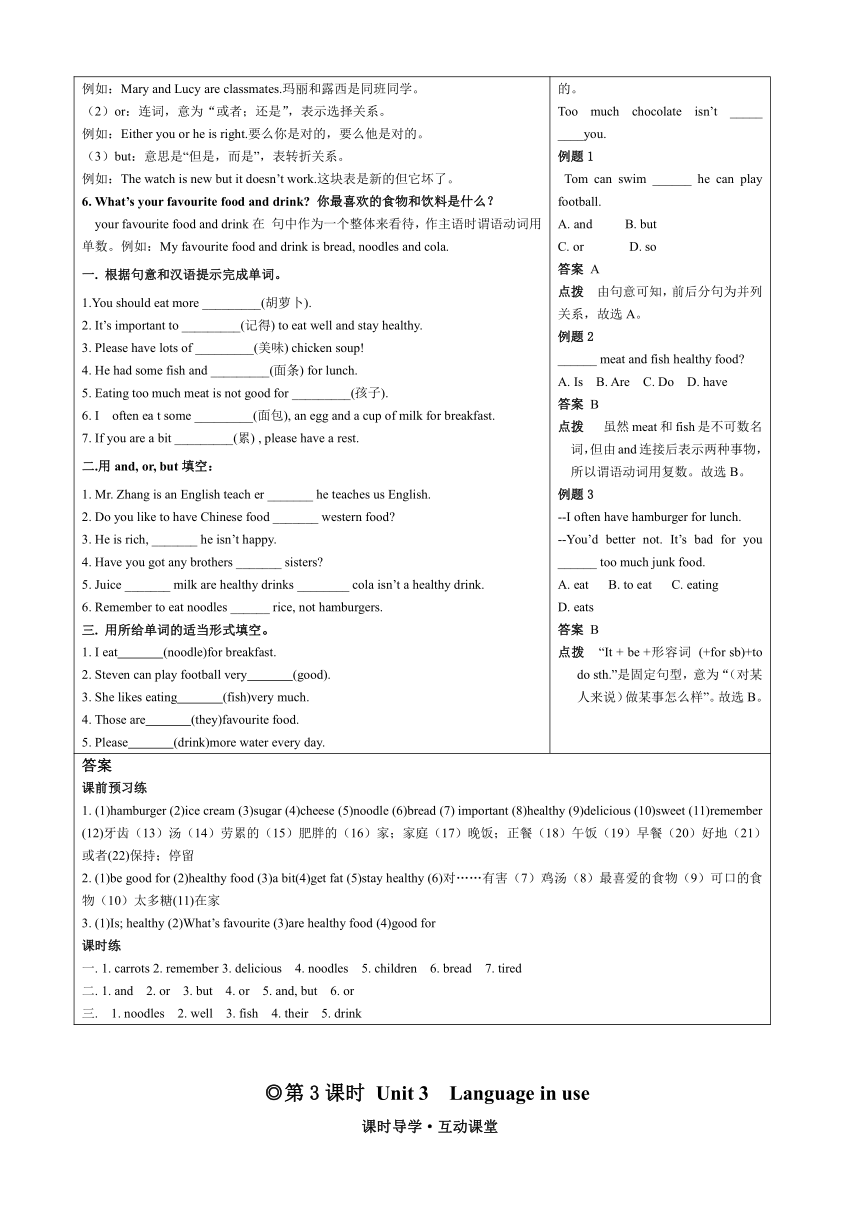
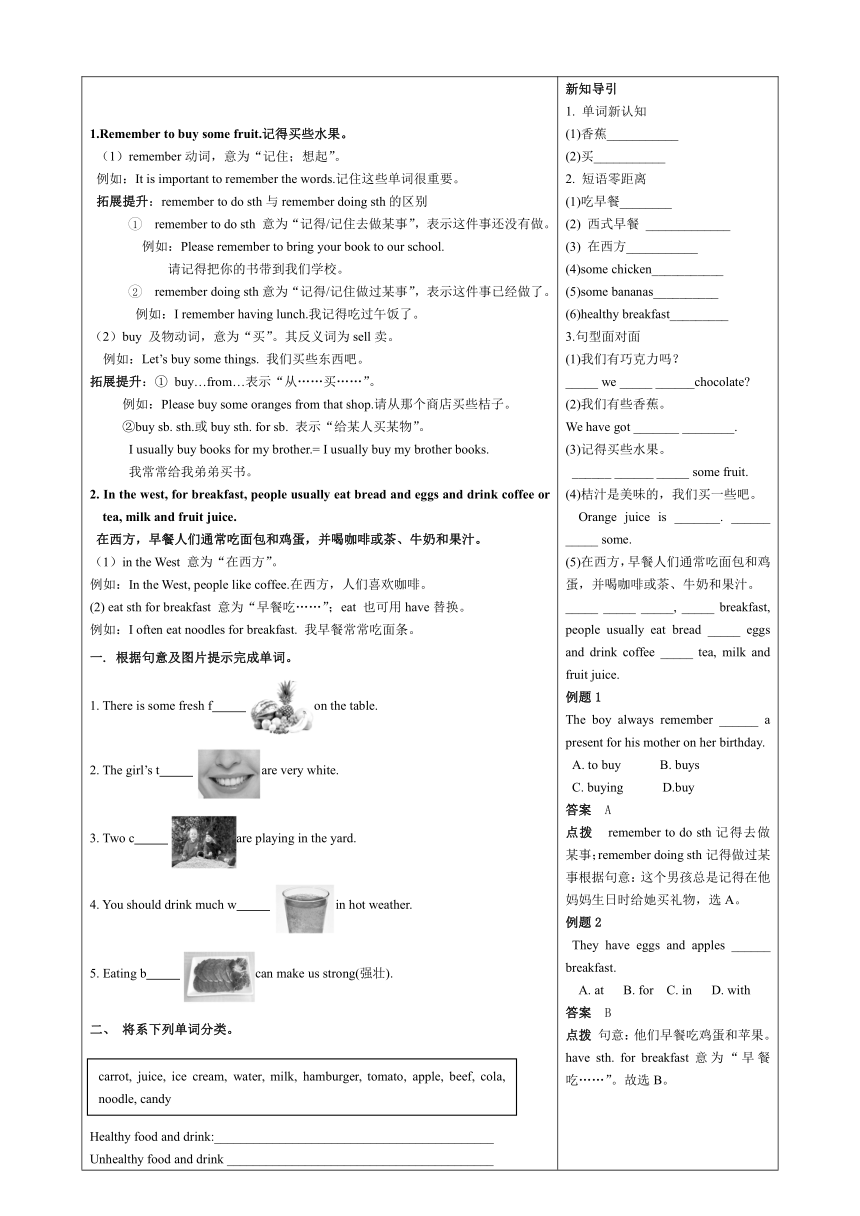
文档简介
中小学教育资源及组卷应用平台
Module 4 Healthy food
◎第1课时 Unit1 We’ve got lots of apples.
课时导学·互动课堂
1. …let’s go shopping for food and drink. ……我们去购物买些食物和饮料吧。(1)let sb do sth意为“让某人做某事”。例如:Let’s go to school.咱们去上学吧。 (2)go shopping意为“去买东西,去购物”,其同义短语为do some shopping。例如:I go shopping with my sister on Sunday.在前星期天我和姐姐去购物。 (3)food不可数名词,意为“食物,食品”。例如:We like Chinese food.我们喜欢中国食品。拓展提升:食品类不可数名词有:meat肉;beef牛肉;chicken鸡肉;fish鱼肉;rice米饭等。 (4)drink不可数名词,意为“饮料”。例如:Have you have got any drink?你有饮料吗?拓展提升:饮料类不可数名词有:juice果汁;milk牛奶;orange桔汁;water水;tea茶;coffee咖啡等。2. …we haven’t got any meat.……我们没有肉了。 这是一个由have got 构成的否定句。have got 意为“有,拥有”,其否定形式为have not got,可缩写为haven’t got。例如:I have got some apples. I haven’t got any apples. 我有一些苹果。 我没有苹果。拓展提升 have got的第三人称单数形式为has got,其否定形式为has not got可缩写为hasn’t。3. Too much chocolate isn’t good for you.吃太多的巧克力对您的身体不好。(1)too much意为“太多的”,其后接不可数名词。例如:I have got too much milk.我有太多的牛奶。温馨提示:too many也意为“太多的”,其后接可数名词的复数形式。例如:He has got too many books.他有太多的书。(2) be good for意为“对……有好处,对……有益”,其反义词组为be bad for “对……有害,对……有坏处”。 例如:vegetables are good for us.蔬菜对我们有好处。 Hamburgers are bad for you.汉堡对你不好。4. What kind of fruit?什么种类的水果?kind可数名词,意为“品种,种类” 。在英语中,表示 “一种事物”,常用a kind of… ;表示“各种各样的”用 all kinds of;而what kind of 则表示“哪一种,哪一类”。例如:What kind of fruit have you got?你有哪一种水果? There are all kind of bags in the shop.商店里有各种各样的包。5. We haven’t got any oranges, so let’s get some.我们没有桔子了,所以我们买些桔子吧。(1)so连词,意为“因此,所以”。例如:He is too hungry, so he eats too much food.他太饿了,所以他吃了许多食物。 (2)some代词,意为“一些,若干”。 一般用于肯定句中。例如:I have got some books.我有一些书。拓展提升: some用于疑问句时,表示建议、请求或希望得到肯定回答。例如:How about some coffee?一些咖啡怎么样?一、根据句意及首字母和图片提示完成单词。1. Eating all kinds of v ?is good for us. 2. —Can I help you, madam? —I want two kilos(千克)of c ?3. C ? is healthy food. I like it very much.4. I will give my sister two boxes of c ?on her birthday. 5. —What are these? —They are t ?. 二. 用所给词的适当形式填空。1. Jack, let’s (go)and have a rest. 2. Jane has got many (potato)in the market. 3. I often drink (coffee)at night. 4. The boy eats too (many)meat every day. 5. Li Hua wants to go (shop)for some apple s on Sunday. 三. 单项选择。( ) 1.Have you got ____ fruit? A. some B. any C. a D. an ( ) 2.Let’s ______ fishing. A. go B. to go C. going D. goes ( ) 3 .Have you got any________? A. tomatos B. tomato C. tomatoes D. a tomato (4)Drinking more water is good _______ you. A. for B. at C. to D.of (5) We have got _____of milk. A.lot B.lots C. much D. many 新知导引1.单词新认知 (1)蔬菜______(2) 巧克力________(3) 糖果________(4)水果_______ (5)食物,饮料______ (6) 肉______ (7) 豆_______ (8)牛肉 _________ (9)胡萝卜________(10)咖啡_______ (11果汁______ (12)茶_______ (13)potato______ (14)tomato_______ (15)chicken _______ (16)water______ (17)milk________ (18) kind ______(19)get_________(20)have_______ (21)bad_______ (22)so______2.短语零距离(1)去买东西,去购物________ (2)有;拥有____________ (3)太多 ____________ (4)让我们做某事 _____________ (5)some fruit____________ (6)lots of __________ (7)some tomatoes________ (8)how about…_________ 3.句型面对面(1)我们没有肉了。 We _____ _____ _____ meat. (2)太多的巧克力对你的身体不好。 Too much chocolate isn’t _____ _____ you (3)我们有许多苹果。 We’ve got ______ ______ apples. (4)一些桔汁怎么样? ______ ______ some orange juice? (5)—他有鸡肉吗?--不,他没有。 --_____ he _____ _____ chicken? --No, he _______.例题 1 Tom ______ got any brothers. A. doesn’t have B. haven’t C. hasn’t D. don’t have答案 C点拨 本题考查have got 的否定形式。have got 的否定形式直接在have后加not;当主语为第三人称单数时,用has got,其否定形式在has后加not,可缩写为hasn’t。故选C。例题2 Don’t eat __________ chocolate. It isn’t good for you. A. too many B. too much C many too D. much too答案 B点拨 too much 意为“太多的”修饰不可数名词;too many意为“太多的”修饰可数名词。chocolate是不可数名词,故选B。例题3 The girl gets up early, _____ she is never late for school. A. and B. but C. so D. or答案 C点拨 句意:这个女孩早早起床,因此她从不迟到。so因此;and和;but但是;or或者。根据句意选C。
答案课前预习练1. (1)vegetable (2)chocolate (3)candy (4)fruit (5)food (6)meat (7)bean (8)beef (9)carrot (10)coffee (11)juice (12)tea (13)马铃薯(14)西红柿(15)鸡肉(16)水(17)牛奶(18)种类(19)得到(20)有;吃,喝(21)坏的;不好的(22)因此;所以 2. (1)go shopping (2)have got (3)too much (4)let’s do sth. (5)一些水果(6)大量;许多(7)一些西红柿(8)(征求意见)……好吗? ……行吗? 3. (1)haven’t got any (2)good for (3)lots of (4)How about (5)Has; got any; hasn’t课时练一. 1. vegetables 2. carrots 3. Chicken 4. chocolate 5. tomatoes二. 1. go 2. potatoes 3. coffee 4. much 5. shopping三. 1—5 BCCAB
◎第2课时 Unit 2 Is your food and drink healthy?
课时导学·互动课堂
1. Eat the right food and be healthy.吃合适的食物并保持健康。(1)这是一个祈使句通常用来向对方发出命令、提出要求或建议。 (2)句中and是一个并列连词,可以连接两个并列的单词、短语或句子。例如:You and I are good friends.你和我是好朋友。 (3)healthy形容词,意为“健康的”,其反义词为unhealthy,意为“不健康的”。拓展提升 health不可数名词,意为“健康”。 in good healthy “身体健康”,常与be连用。例如:My grandpa is 70 years old. But he is in good health.我爷爷70岁了,但他的身体很健康。2. Milk, cheese and fish are good for your teeth.牛奶、奶酪和鱼对你的牙齿有好处。(1)当两个或两个以上的不可数名词作主语时,谓语动词用复数形式。例如:Cola and candy are bad for your teeth..例如:Meat and rice are good for our health.肉和米饭对我们的健康有好处。 (2)teeth名词,意为“牙齿”,是tooth的复数形式。例如:The baby has got three teeth.这个小孩有三颗牙了。3. A bit tired?有点儿劳累吗?(1)本句是一个省略句,其完整句子应该是:Are you a bit tired?你有点劳累吗? (2)a bit意为“稍微;有点儿”。可用来修饰形容词、副词或动词。 例如:The fruit is a bit sweet.这水果有点儿甜。(修饰形容词) He walks a bit fast.他走路有点儿快。(修饰副词) Please turn the TV down a bit.请把电视的音量稍微关小一点儿。(修饰动词) 温馨提示: a bit 可以修饰不可数名词但是其后不能直接跟名词,要先加介词of。 A bit of milk一点儿牛奶4. It is important to remember: eat well, stay healthy, and don’t get fat! 记住这些是很重要的:吃好。保持健康,不要变胖!(1)这是一个it句式,其结构为:It + be+ 形容词 +动词不定式。表示“做某事怎么样”。例如:It is important to learn English. 学好英语很重要。(2)eat well意为“吃好”。well是副词,意为“好地”,用来修饰动词eat。 We should eat well in the morning. 在早晨我们应该吃好。 (3)stay healthy意为“保持健康”,相当于be healthy。 We should eat more vegetable and stay healthy.我们应该吃更多的蔬菜并保持健康。5. Eat noodles or rice, not hamburgers.吃面条或米饭,不吃汉堡。or连词,意为“或者;还是”。or 连接并列主语时,谓语动词要与最后的那个主语保持一致。例如:Tom or I am going with you?拓展提升:and, or, but 的区别(1)and:表示“和,又,与,并”,连接两个名词、动词或句子,表示并列关系。例如:Mary and Lucy are classmates.玛丽和露西是同班同学。(2)or:连词,意为“或者;还是”,表示选择关系。例如:Either you or he is right.要么你是对的,要么他是对的。(3)but:意思是“但是,而是”,表转折关系。例如:The watch is new but it doesn’t work.这块表是新的但它坏了。6. What’s your favourite food and drink? 你最喜欢的食物和饮料是什么?your favourite food and drink在 句中作为一个整体来看待,作主语时谓语动词用单数。例如:My favourite food and drink is bread, noodles and cola.一. 根据句意和汉语提示完成单词。1.You should eat more _________(胡萝卜). 2. It’s important to _________(记得) to eat well and stay healthy. 3. Please have lots of _________(美味) chicken soup! 4. He had some fish and _________(面条) for lunch. 5. Eating too much meat is not good for _________(孩子). 6. I often ea t some _________(面包), an egg and a cup of milk for breakfast. 7. If you are a bit _________(累) , please have a rest. 二.用and, or, but填空:1. Mr. Zhang is an English teach er _______ he teaches us English. 2. Do you like to have Chinese food _______ western food? 3. He is rich, _______ he isn’t happy. 4. Have you got any brothers _______ sisters? 5. Juice _______ milk are healthy drinks ________ cola isn’t a healthy drink. 6. Remember to eat noodles ______ rice, not hamburgers.三. 用所给单词的适当形式填空。1. I eat (noodle)for breakfast. 2. Steven can play football very (good). 3. She likes eating (fish)very much. 4. Those are (they)favourite food. 5. Please (drink)more water every day. 新知导引1.单词新认知 (1)汉堡包___________ (2) 冰激凌_________ (3)糖________ (4)奶酪______ (5) 面条________(6)面包 ______ (7) 重要的 ______ (8) 健康的_______ (9)美味的_______(10)甜的 ______ (11)记住;想起 _________ (12) tooth _____(13)soup______ (14) tired_______(15)fat______ (16)home______ (17)dinner_______ (18)lunch_______(19)breakfast______ (20)well_______(21)or_______ (22) stay______ 2.短语零距离(1)对……有益处_____________ (2)健康的食物_________________ (3)稍微;有点儿_________________ (4) 发胖___________ (5)保持健康____________ (6)be bad for___________ (7) chicken soup _________ (8) favourite food_________ (9)delicious food___________ (10)too much sugar_________ (11)at home________ 3.句型面对面(1)你的食物和饮料是健康的吗? _____ your food and drink _____?(2)你最喜欢的食物和饮料是什么? _______ your ______ food and drink?(3)肉和鱼是健康食品 Meat and fish ______ ______ _____.(4)太多的巧克力对你是没有好处的。 Too much chocolate isn’t _____ ____you.例题1 Tom can swim ______ he can play football. A. and B. but C. or D. so答案 A点拨 由句意可知,前后分句为并列关系,故选A。例题2 ______ meat and fish healthy food? A. Is B. Are C. Do D. have答案 B点拨 虽然meat和fish是不可数名词,但由and连接后表示两种事物,所以谓语动词用复数。故选B。例题3 --I often have hamburger for lunch. --You’d better not. It’s bad for you ______ too much junk food. A. eat B. to eat C. eatingD. eats答案 B点拨 “It + be +形容词 (+for sb)+to do sth.”是固定句型,意为“(对某人来说)做某事怎么样”。故选B。
答案课前预习练1. (1)hamburger (2)ice cream (3)sugar (4)cheese (5)noodle (6)bread (7) important (8)healthy (9)delicious (10)sweet (11)remember (12)牙齿(13)汤(14)劳累的(15)肥胖的(16)家;家庭(17)晚饭;正餐(18)午饭(19)早餐(20)好地(21)或者(22)保持;停留2. (1)be good for (2)healthy food (3)a bit(4)get fat (5)stay healthy (6)对……有害(7)鸡汤(8)最喜爱的食物(9)可口的食物(10)太多糖(11)在家3. (1)Is; healthy (2)What’s favourite (3)are healthy food (4)good for课时练一. 1. carrots 2. remember 3. delicious 4. noodles 5. children 6. bread 7. tired二. 1. and 2. or 3. but 4. or 5. and, but 6. or三. 1. noodles 2. well 3. fish 4. their 5. drink
◎第3课时 Unit 3 Language in use
课时导学·互动课堂
1.Remember to buy some fruit.记得买些水果。(1)remember动词,意为“记住;想起”。例如:It is important to remember the words.记住这些单词很重要。拓展提升:remember to do sth与remember doing sth的区别 remember to do sth 意为“记得/记住去做某事”,表示这件事还没有做。例如:Please remember to bring your book to our school.请记得把你的书带到我们学校。 remember doing sth意为“记得/记住做过某事”,表示这件事已经做了。 例如:I remember having lunch.我记得吃过午饭了。(2)buy 及物动词,意为“买”。其反义词为sell卖。 例如:Let’s buy some things. 我们买些东西吧。拓展提升:① buy…from…表示“从……买……”。 例如:Please buy some oranges from that shop.请从那个商店买些桔子。 ②buy sb. sth.或buy sth. for sb. 表示“给某人买某物”。 I usually buy books for my brother.= I usually buy my brother books.我常常给我弟弟买书。2. In the west, for breakfast, people usually eat bread and eggs and drink coffee or tea, milk and fruit juice.在西方,早餐人们通常吃面包和鸡蛋,并喝咖啡或茶、牛奶和果汁。(1)in the West 意为“在西方”。例如:In the West, people like coffee.在西方,人们喜欢咖啡。 (2) eat sth for breakfast 意为“早餐吃……”;eat 也可用have替换。例如:I often eat noodles for breakfast. 我早餐常常吃面条。一. 根据句意及图片提示完成单词。1. There is some fresh f ?on the table. 2. The girl’s t ?are very white. 3. Two c ?are playing in the yard. 4. You should drink much w ?in hot weather. 5. Eating b ?can make us strong(强壮).二、 将系下列单词分类。 Healthy food and drink:___________________________________________ Unhealthy food and drink _________________________________________三. 句型转换。1. He ha s go t some meat for lunch. (改为一般疑问句, 并作肯定回答) — he meat for lunch? — , . 2. I like rice best(最). (改为同义句) _______ is rice. 3. my, some, I, buy, is, and, meat, to, favourite, want(. )(连词成句)? 4. They have got some juice and milk. (改为否定句) They got juice milk. 5. I buy Jim an ice cream. (改为同义句) I an ice cream Jim. 新知导引1. 单词新认知 (1)香蕉___________ (2)买___________2. 短语零距离(1)吃早餐________ (2) 西式早餐 _____________ (3) 在西方___________ (4)some chicken___________ (5)some bananas__________ (6)healthy breakfast_________3.句型面对面 (1)我们有巧克力吗? _____ we _____ ______chocolate? (2)我们有些香蕉。 We have got _______ ________. (3)记得买些水果。 ______ ______ _____ some fruit. (4)桔汁是美味的,我们买一些吧。 Orange juice is _______. ______ _____ some. (5)在西方,早餐人们通常吃面包和鸡蛋,并喝咖啡或茶、牛奶和果汁。 _____ _____ _____, _____ breakfast, people usually eat bread _____ eggs and drink coffee _____ tea, milk and fruit juice.例题1 The boy always remember ______ a present for his mother on her birthday. A. to buy B. buys C. buying D.buy答案 A点拨 remember to do sth记得去做某事;remember doing sth记得做过某事根据句意:这个男孩总是记得在他妈妈生日时给她买礼物,选A。例题2 They have eggs and apples ______ breakfast. A. at B. for C. in D. with答案 B点拨 句意:他们早餐吃鸡蛋和苹果。have sth. for breakfast意为“早餐吃……”。故选B。
答案课前预习练1. (1) banana (2)buy 2. (1)have breakfast (2)western breakfast (3)in the West (4)一些鸡肉(5)一些香蕉(6)健康的早餐3. (1)Have; got any (2)some bananas (3)Remember to buy (4)delicious; Let’s buy(5)In the West; for; and; or课时练一.1. fruit 2. teeth 3. children 4. water 5. beef二. Healthy food and drink: carrot. Juice, water, milk, tomato, apple, beef, noodle Unhealthy food and drink:ice cream, hamburger, cola, candy三. 1. Has; got any; Yes; he has 2. My favourite food 3. Meat is my favourite and I want to buy some. 4. haven’t; any; or 5. buy; for
模块专题突破
专题归纳·语法透析
1.have got 的用法have got表示“某人拥有某物”。have got句式中have有人称和数的变化,即当句子主语为第三人称单数时,用has got形式。have got在肯定句、否定句、疑问句以及答语中的变化形式:肯定否定疑问回答I have got three new dictionaries. I (1)_____ _____ /_____ got three new dictionaries.(2)_____ you _____ three new dictionaries?(3)Yes, I _____./ No, I _____.He/She has got three new dictionaries. He/She (4) —— ____/___ got three new dictionaries.(5)_____ he/she _____ three newdictionaries?(6)Yes, he/she __./ No, he/she ______.We/You/ They have got a computer room.(7)We/ You/ They ____ ____/___got a computer room.(8)___we/you/they _____a computerroom?(9)Yes, we/I/they _________. No, we/I /they___.温馨提示:there be和have/ has got都表示“有”,但两者表示拥有的对象不同。 1. there be句型表示“存在”,指“某地/某市有某人/某物”。 There (10)______ a book on the desk.桌子上有一本书。 There (11)______ some boys in the room.房间里有一些男孩。 2. have got表示“人拥有”,指“某人(拥)有某物”,是一种所有关系。 I (12)_______ ______ a cat.我有一只猫。 She (13)_____ _______ some fruit. 他有些水果。2. some和any的用法some和any 既可以修饰可数名词又可以修饰不可数名词,some常用在肯定句中,而any则常用在否定和疑问句中。 例如: I have (1)_______ tea here. 我这儿有些茶叶。 I can’t see (2)______ tea. 我没看见茶叶。 Have you got (3)_____ friends at school? 你在学校有些朋友吗? 温馨提示:在表示建议、反问、请求的疑问句中或期望得到肯定回答时,多用some而不用any。当any表示“任何”的意义,起强调作用时, 可以用在肯定句中。例如: Would you like (4)______ coffee? 你要不要来点咖啡? How about (5) ______ fruit juice? 来点水果汁如何? (6)______ student can answer this question.任何学生都可以回答这个问题。3.可数名词与不可数名词普通名词分为可数名词和不可数名词。可数名词可按个数计算,分单数和复数两种形式。单数可与a或an连用,数量超过1时要用复数。不可数名词不能按个数计算,没有复数,milk, meat和rice等物质名词以及health等抽象名词都是不可数名词。可数名词和不可数名词用法对比可数名词不可数名词冠词可与a(n)连用不能与a(n)连用修饰数词many, some, any, a lot of(许多) much, some, any, a lot of, a little(一点儿)主谓一致单数作主语,谓语动词用第三人称单数;复数作主语,谓语动词用复数。不可数名词作主语,谓语动词用第三人称单数。表示具体数量数词+名词(单数或复数),如one student(1个学生),ten apples(10个苹果)用“数词+计量单位词+of”结构,如two bags of rice(两袋大米),a cup of tea(一杯茶)提问数量用“how many+可数名词复数”用“how much+不可数名词”例如:Apples (1)_______ my favorite fruit.苹果是我最喜欢的水果。 Cola (2)______ healthy drink.可乐不是一种健康饮料。 (3) ______ ______ ______ have you got?你有多少香蕉? (4) ______ ______ _____ is there in the bottle?瓶子里有多少牛奶? 温馨提示:两个及两个以上不可数名词用and连接起来作主语,表示两种或两种以上的食物时,谓语动词用复数。 例如:Meat and fish (5)_______ my favorite food.肉和鱼是我最喜欢的食品。可数名词单数变复数 规则变化歌可数名词变复数,六条规律要记住。 一般后面加-s; s, x, sh, ch后加-es。 f(e)变为v,辅后y变i,然后在家-es。 要是以o来结尾,多数后加-s。 以下几个是特殊记, 英雄(hero), 土豆(potato),西红柿(tomato),一定要加-es。不规则变化歌 名词复数特殊记,不规则变化看仔细。 oo常要变ee(foot-feet, tooth-teeth), 男人女人a变e(man-men, woman-women), child后加-ren(child-children), 单复数同形别忘记(Chinese-Chinese, Japanese-Japanese, sheep-sheep, deer-deer)。 一、用所给词的适当形式填空。1. We must eat lots of fruit and _________(vegetable). 2. She _________(have) got many friends in China.3.Carrots, eggs and sweet _______(potato) are good for your eyes. 4. I haven’t got __________(some) money. 5. There is some ________(bread) in the fridge. 6. My father buys some_______ (chicken). 7. ________(be) there any pork in the dining hall? 8. There are some ________(orange) on the table.二、用 some, any填空。1. —Have you got _______ fruit? —Yes, we have. 2. —Have we got _______ meat? —No, we haven’t. 3. We’ve got ________ oranges and _______ apples. 4. We have got _______ melons. 5. We haven’t got _______ tomatoes.三、句型转换。1. They have got some water.(改否定句) They ______ ______ ______ water. 2. They have got some onions.(变一般疑问句) ______ they ______ _____ onions?3.Have they got any melons? (做肯定和否定回答) Yes, they ___________. No, they ___________.4.Tom has a lovely dog.(改写同义句) Tom ______ _______ a lovely dog. 5. I have got five apples. (对划线部分提问) _______ ______ apples have you got apples?
专题讲座·聚焦写作
写作素材
1. It’s important to do……做……是重要的
2. be good for 对……有好处
3.be bad for 对……有害
4. have breakfast吃早餐
5.every morning 每天早晨
6. a cup of 一杯……
7. too much太多
典型例题
Ray Sahelian MD 是一位 (?http:?/??/?www.21cnjy.com?)世界著名的营养学专家。下面是他为孩子们罗列的一张健康食物表。阅读后,请据此写一篇短文,向你的同桌介绍三餐如何吃才能保持健康!
Breakfast an egg, some bread, an apple, a cup of milk
Lunch noodles with some vegetables; rice with some chicken or fish
Dinner some soup
Don’t eat too much fried (油炸的) food.
要求:1. 条理清楚、意思连贯、语句通顺、标点正确。
2. 50-60词。
范文 (1)It’s important to have a good breakfast every morning. (2)For breakfast, you can eat an egg, some bread and an apple. (3)A cup of milk is good for you, too. For lunch, you can eat noodles with some vegetables (4)or rice with some chicken or fish. For dinner, you can have some soup. Don’t eat (5)too much fried food. 点评 (1) 这是一个it句式,其结构为:It + be+ 形容词 +动词不定式。表示“做某事怎么样”。 (2) eat sth. for breakfast表示“早餐吃某物”。eat也可用have代替。(3)a cup of表示“一杯……”。 (4) or连词,意为“或者;还是”,表示选择关系。(5)too much意为“太多的” 修饰不可数名词。
练习
根据下表内容, 请以“Our Favourite Food and Drinks”为题, 写一篇短文, 并对食物和饮料作简单的评价。
Favourite Food Favourite Drinks
I chicken; tomatoes cola
My parents vegetables; fish tea
Tom(my brother) beef; noodles milk
要求:60个词左右
_________________________________________________________________________________________________________________________________________________________________________________________________________________________________________________________________________________________________________________________________________________________________________
答案
专题归纳 .语法透析
1.(1)have not/haven’t (2)Have; got (3)have; haven’t (4)has not/hasn’t (5)Has; got (6)has; hasn’t (7) have not/haven’t (8) Have; got (9) have; haven’t(10)is (11)are (12)have got (13)has got
2.(1)some (2)any (3)any (4)some (5)some(6)Any
3.(1)are (2)is (3)How many bananas (4)Hoe much milk (5)are
语法练习
一、1.vegetables 2.has 3.potatoes 4.any 5.bread 6.chicken 7.Is 8.oranges
二、1. any 2. any 3. some, some 4. some 5. any
三、1.haven’t got any 2.Have; got any 3.Have; haven’t 4.has got 5. How many
专题讲座·聚焦写作
练习
One possible version:
Our Favourite Food and Drinks
My family has got four people. They are my parents, my brother and I.
My parents like vegetables and fish. They are healthy food. And they like tea very much. Tom is my brother. Beef and noodles are his favourite food. His favourite drink is milk. Milk is a healthy drink.
My favourite food are chicken and tomatoes. They are healthy food. Cola isn’t healthy, but it is my favourite drink.
carrot, juice, ice cream, water, milk, hamburger, tomato, apple, beef, cola, noodle, candy
Module 4 Healthy food
◎第1课时 Unit1 We’ve got lots of apples.
课时导学·互动课堂
1. …let’s go shopping for food and drink. ……我们去购物买些食物和饮料吧。(1)let sb do sth意为“让某人做某事”。例如:Let’s go to school.咱们去上学吧。 (2)go shopping意为“去买东西,去购物”,其同义短语为do some shopping。例如:I go shopping with my sister on Sunday.在前星期天我和姐姐去购物。 (3)food不可数名词,意为“食物,食品”。例如:We like Chinese food.我们喜欢中国食品。拓展提升:食品类不可数名词有:meat肉;beef牛肉;chicken鸡肉;fish鱼肉;rice米饭等。 (4)drink不可数名词,意为“饮料”。例如:Have you have got any drink?你有饮料吗?拓展提升:饮料类不可数名词有:juice果汁;milk牛奶;orange桔汁;water水;tea茶;coffee咖啡等。2. …we haven’t got any meat.……我们没有肉了。 这是一个由have got 构成的否定句。have got 意为“有,拥有”,其否定形式为have not got,可缩写为haven’t got。例如:I have got some apples. I haven’t got any apples. 我有一些苹果。 我没有苹果。拓展提升 have got的第三人称单数形式为has got,其否定形式为has not got可缩写为hasn’t。3. Too much chocolate isn’t good for you.吃太多的巧克力对您的身体不好。(1)too much意为“太多的”,其后接不可数名词。例如:I have got too much milk.我有太多的牛奶。温馨提示:too many也意为“太多的”,其后接可数名词的复数形式。例如:He has got too many books.他有太多的书。(2) be good for意为“对……有好处,对……有益”,其反义词组为be bad for “对……有害,对……有坏处”。 例如:vegetables are good for us.蔬菜对我们有好处。 Hamburgers are bad for you.汉堡对你不好。4. What kind of fruit?什么种类的水果?kind可数名词,意为“品种,种类” 。在英语中,表示 “一种事物”,常用a kind of… ;表示“各种各样的”用 all kinds of;而what kind of 则表示“哪一种,哪一类”。例如:What kind of fruit have you got?你有哪一种水果? There are all kind of bags in the shop.商店里有各种各样的包。5. We haven’t got any oranges, so let’s get some.我们没有桔子了,所以我们买些桔子吧。(1)so连词,意为“因此,所以”。例如:He is too hungry, so he eats too much food.他太饿了,所以他吃了许多食物。 (2)some代词,意为“一些,若干”。 一般用于肯定句中。例如:I have got some books.我有一些书。拓展提升: some用于疑问句时,表示建议、请求或希望得到肯定回答。例如:How about some coffee?一些咖啡怎么样?一、根据句意及首字母和图片提示完成单词。1. Eating all kinds of v ?is good for us. 2. —Can I help you, madam? —I want two kilos(千克)of c ?3. C ? is healthy food. I like it very much.4. I will give my sister two boxes of c ?on her birthday. 5. —What are these? —They are t ?. 二. 用所给词的适当形式填空。1. Jack, let’s (go)and have a rest. 2. Jane has got many (potato)in the market. 3. I often drink (coffee)at night. 4. The boy eats too (many)meat every day. 5. Li Hua wants to go (shop)for some apple s on Sunday. 三. 单项选择。( ) 1.Have you got ____ fruit? A. some B. any C. a D. an ( ) 2.Let’s ______ fishing. A. go B. to go C. going D. goes ( ) 3 .Have you got any________? A. tomatos B. tomato C. tomatoes D. a tomato (4)Drinking more water is good _______ you. A. for B. at C. to D.of (5) We have got _____of milk. A.lot B.lots C. much D. many 新知导引1.单词新认知 (1)蔬菜______(2) 巧克力________(3) 糖果________(4)水果_______ (5)食物,饮料______ (6) 肉______ (7) 豆_______ (8)牛肉 _________ (9)胡萝卜________(10)咖啡_______ (11果汁______ (12)茶_______ (13)potato______ (14)tomato_______ (15)chicken _______ (16)water______ (17)milk________ (18) kind ______(19)get_________(20)have_______ (21)bad_______ (22)so______2.短语零距离(1)去买东西,去购物________ (2)有;拥有____________ (3)太多 ____________ (4)让我们做某事 _____________ (5)some fruit____________ (6)lots of __________ (7)some tomatoes________ (8)how about…_________ 3.句型面对面(1)我们没有肉了。 We _____ _____ _____ meat. (2)太多的巧克力对你的身体不好。 Too much chocolate isn’t _____ _____ you (3)我们有许多苹果。 We’ve got ______ ______ apples. (4)一些桔汁怎么样? ______ ______ some orange juice? (5)—他有鸡肉吗?--不,他没有。 --_____ he _____ _____ chicken? --No, he _______.例题 1 Tom ______ got any brothers. A. doesn’t have B. haven’t C. hasn’t D. don’t have答案 C点拨 本题考查have got 的否定形式。have got 的否定形式直接在have后加not;当主语为第三人称单数时,用has got,其否定形式在has后加not,可缩写为hasn’t。故选C。例题2 Don’t eat __________ chocolate. It isn’t good for you. A. too many B. too much C many too D. much too答案 B点拨 too much 意为“太多的”修饰不可数名词;too many意为“太多的”修饰可数名词。chocolate是不可数名词,故选B。例题3 The girl gets up early, _____ she is never late for school. A. and B. but C. so D. or答案 C点拨 句意:这个女孩早早起床,因此她从不迟到。so因此;and和;but但是;or或者。根据句意选C。
答案课前预习练1. (1)vegetable (2)chocolate (3)candy (4)fruit (5)food (6)meat (7)bean (8)beef (9)carrot (10)coffee (11)juice (12)tea (13)马铃薯(14)西红柿(15)鸡肉(16)水(17)牛奶(18)种类(19)得到(20)有;吃,喝(21)坏的;不好的(22)因此;所以 2. (1)go shopping (2)have got (3)too much (4)let’s do sth. (5)一些水果(6)大量;许多(7)一些西红柿(8)(征求意见)……好吗? ……行吗? 3. (1)haven’t got any (2)good for (3)lots of (4)How about (5)Has; got any; hasn’t课时练一. 1. vegetables 2. carrots 3. Chicken 4. chocolate 5. tomatoes二. 1. go 2. potatoes 3. coffee 4. much 5. shopping三. 1—5 BCCAB
◎第2课时 Unit 2 Is your food and drink healthy?
课时导学·互动课堂
1. Eat the right food and be healthy.吃合适的食物并保持健康。(1)这是一个祈使句通常用来向对方发出命令、提出要求或建议。 (2)句中and是一个并列连词,可以连接两个并列的单词、短语或句子。例如:You and I are good friends.你和我是好朋友。 (3)healthy形容词,意为“健康的”,其反义词为unhealthy,意为“不健康的”。拓展提升 health不可数名词,意为“健康”。 in good healthy “身体健康”,常与be连用。例如:My grandpa is 70 years old. But he is in good health.我爷爷70岁了,但他的身体很健康。2. Milk, cheese and fish are good for your teeth.牛奶、奶酪和鱼对你的牙齿有好处。(1)当两个或两个以上的不可数名词作主语时,谓语动词用复数形式。例如:Cola and candy are bad for your teeth..例如:Meat and rice are good for our health.肉和米饭对我们的健康有好处。 (2)teeth名词,意为“牙齿”,是tooth的复数形式。例如:The baby has got three teeth.这个小孩有三颗牙了。3. A bit tired?有点儿劳累吗?(1)本句是一个省略句,其完整句子应该是:Are you a bit tired?你有点劳累吗? (2)a bit意为“稍微;有点儿”。可用来修饰形容词、副词或动词。 例如:The fruit is a bit sweet.这水果有点儿甜。(修饰形容词) He walks a bit fast.他走路有点儿快。(修饰副词) Please turn the TV down a bit.请把电视的音量稍微关小一点儿。(修饰动词) 温馨提示: a bit 可以修饰不可数名词但是其后不能直接跟名词,要先加介词of。 A bit of milk一点儿牛奶4. It is important to remember: eat well, stay healthy, and don’t get fat! 记住这些是很重要的:吃好。保持健康,不要变胖!(1)这是一个it句式,其结构为:It + be+ 形容词 +动词不定式。表示“做某事怎么样”。例如:It is important to learn English. 学好英语很重要。(2)eat well意为“吃好”。well是副词,意为“好地”,用来修饰动词eat。 We should eat well in the morning. 在早晨我们应该吃好。 (3)stay healthy意为“保持健康”,相当于be healthy。 We should eat more vegetable and stay healthy.我们应该吃更多的蔬菜并保持健康。5. Eat noodles or rice, not hamburgers.吃面条或米饭,不吃汉堡。or连词,意为“或者;还是”。or 连接并列主语时,谓语动词要与最后的那个主语保持一致。例如:Tom or I am going with you?拓展提升:and, or, but 的区别(1)and:表示“和,又,与,并”,连接两个名词、动词或句子,表示并列关系。例如:Mary and Lucy are classmates.玛丽和露西是同班同学。(2)or:连词,意为“或者;还是”,表示选择关系。例如:Either you or he is right.要么你是对的,要么他是对的。(3)but:意思是“但是,而是”,表转折关系。例如:The watch is new but it doesn’t work.这块表是新的但它坏了。6. What’s your favourite food and drink? 你最喜欢的食物和饮料是什么?your favourite food and drink在 句中作为一个整体来看待,作主语时谓语动词用单数。例如:My favourite food and drink is bread, noodles and cola.一. 根据句意和汉语提示完成单词。1.You should eat more _________(胡萝卜). 2. It’s important to _________(记得) to eat well and stay healthy. 3. Please have lots of _________(美味) chicken soup! 4. He had some fish and _________(面条) for lunch. 5. Eating too much meat is not good for _________(孩子). 6. I often ea t some _________(面包), an egg and a cup of milk for breakfast. 7. If you are a bit _________(累) , please have a rest. 二.用and, or, but填空:1. Mr. Zhang is an English teach er _______ he teaches us English. 2. Do you like to have Chinese food _______ western food? 3. He is rich, _______ he isn’t happy. 4. Have you got any brothers _______ sisters? 5. Juice _______ milk are healthy drinks ________ cola isn’t a healthy drink. 6. Remember to eat noodles ______ rice, not hamburgers.三. 用所给单词的适当形式填空。1. I eat (noodle)for breakfast. 2. Steven can play football very (good). 3. She likes eating (fish)very much. 4. Those are (they)favourite food. 5. Please (drink)more water every day. 新知导引1.单词新认知 (1)汉堡包___________ (2) 冰激凌_________ (3)糖________ (4)奶酪______ (5) 面条________(6)面包 ______ (7) 重要的 ______ (8) 健康的_______ (9)美味的_______(10)甜的 ______ (11)记住;想起 _________ (12) tooth _____(13)soup______ (14) tired_______(15)fat______ (16)home______ (17)dinner_______ (18)lunch_______(19)breakfast______ (20)well_______(21)or_______ (22) stay______ 2.短语零距离(1)对……有益处_____________ (2)健康的食物_________________ (3)稍微;有点儿_________________ (4) 发胖___________ (5)保持健康____________ (6)be bad for___________ (7) chicken soup _________ (8) favourite food_________ (9)delicious food___________ (10)too much sugar_________ (11)at home________ 3.句型面对面(1)你的食物和饮料是健康的吗? _____ your food and drink _____?(2)你最喜欢的食物和饮料是什么? _______ your ______ food and drink?(3)肉和鱼是健康食品 Meat and fish ______ ______ _____.(4)太多的巧克力对你是没有好处的。 Too much chocolate isn’t _____ ____you.例题1 Tom can swim ______ he can play football. A. and B. but C. or D. so答案 A点拨 由句意可知,前后分句为并列关系,故选A。例题2 ______ meat and fish healthy food? A. Is B. Are C. Do D. have答案 B点拨 虽然meat和fish是不可数名词,但由and连接后表示两种事物,所以谓语动词用复数。故选B。例题3 --I often have hamburger for lunch. --You’d better not. It’s bad for you ______ too much junk food. A. eat B. to eat C. eatingD. eats答案 B点拨 “It + be +形容词 (+for sb)+to do sth.”是固定句型,意为“(对某人来说)做某事怎么样”。故选B。
答案课前预习练1. (1)hamburger (2)ice cream (3)sugar (4)cheese (5)noodle (6)bread (7) important (8)healthy (9)delicious (10)sweet (11)remember (12)牙齿(13)汤(14)劳累的(15)肥胖的(16)家;家庭(17)晚饭;正餐(18)午饭(19)早餐(20)好地(21)或者(22)保持;停留2. (1)be good for (2)healthy food (3)a bit(4)get fat (5)stay healthy (6)对……有害(7)鸡汤(8)最喜爱的食物(9)可口的食物(10)太多糖(11)在家3. (1)Is; healthy (2)What’s favourite (3)are healthy food (4)good for课时练一. 1. carrots 2. remember 3. delicious 4. noodles 5. children 6. bread 7. tired二. 1. and 2. or 3. but 4. or 5. and, but 6. or三. 1. noodles 2. well 3. fish 4. their 5. drink
◎第3课时 Unit 3 Language in use
课时导学·互动课堂
1.Remember to buy some fruit.记得买些水果。(1)remember动词,意为“记住;想起”。例如:It is important to remember the words.记住这些单词很重要。拓展提升:remember to do sth与remember doing sth的区别 remember to do sth 意为“记得/记住去做某事”,表示这件事还没有做。例如:Please remember to bring your book to our school.请记得把你的书带到我们学校。 remember doing sth意为“记得/记住做过某事”,表示这件事已经做了。 例如:I remember having lunch.我记得吃过午饭了。(2)buy 及物动词,意为“买”。其反义词为sell卖。 例如:Let’s buy some things. 我们买些东西吧。拓展提升:① buy…from…表示“从……买……”。 例如:Please buy some oranges from that shop.请从那个商店买些桔子。 ②buy sb. sth.或buy sth. for sb. 表示“给某人买某物”。 I usually buy books for my brother.= I usually buy my brother books.我常常给我弟弟买书。2. In the west, for breakfast, people usually eat bread and eggs and drink coffee or tea, milk and fruit juice.在西方,早餐人们通常吃面包和鸡蛋,并喝咖啡或茶、牛奶和果汁。(1)in the West 意为“在西方”。例如:In the West, people like coffee.在西方,人们喜欢咖啡。 (2) eat sth for breakfast 意为“早餐吃……”;eat 也可用have替换。例如:I often eat noodles for breakfast. 我早餐常常吃面条。一. 根据句意及图片提示完成单词。1. There is some fresh f ?on the table. 2. The girl’s t ?are very white. 3. Two c ?are playing in the yard. 4. You should drink much w ?in hot weather. 5. Eating b ?can make us strong(强壮).二、 将系下列单词分类。 Healthy food and drink:___________________________________________ Unhealthy food and drink _________________________________________三. 句型转换。1. He ha s go t some meat for lunch. (改为一般疑问句, 并作肯定回答) — he meat for lunch? — , . 2. I like rice best(最). (改为同义句) _______ is rice. 3. my, some, I, buy, is, and, meat, to, favourite, want(. )(连词成句)? 4. They have got some juice and milk. (改为否定句) They got juice milk. 5. I buy Jim an ice cream. (改为同义句) I an ice cream Jim. 新知导引1. 单词新认知 (1)香蕉___________ (2)买___________2. 短语零距离(1)吃早餐________ (2) 西式早餐 _____________ (3) 在西方___________ (4)some chicken___________ (5)some bananas__________ (6)healthy breakfast_________3.句型面对面 (1)我们有巧克力吗? _____ we _____ ______chocolate? (2)我们有些香蕉。 We have got _______ ________. (3)记得买些水果。 ______ ______ _____ some fruit. (4)桔汁是美味的,我们买一些吧。 Orange juice is _______. ______ _____ some. (5)在西方,早餐人们通常吃面包和鸡蛋,并喝咖啡或茶、牛奶和果汁。 _____ _____ _____, _____ breakfast, people usually eat bread _____ eggs and drink coffee _____ tea, milk and fruit juice.例题1 The boy always remember ______ a present for his mother on her birthday. A. to buy B. buys C. buying D.buy答案 A点拨 remember to do sth记得去做某事;remember doing sth记得做过某事根据句意:这个男孩总是记得在他妈妈生日时给她买礼物,选A。例题2 They have eggs and apples ______ breakfast. A. at B. for C. in D. with答案 B点拨 句意:他们早餐吃鸡蛋和苹果。have sth. for breakfast意为“早餐吃……”。故选B。
答案课前预习练1. (1) banana (2)buy 2. (1)have breakfast (2)western breakfast (3)in the West (4)一些鸡肉(5)一些香蕉(6)健康的早餐3. (1)Have; got any (2)some bananas (3)Remember to buy (4)delicious; Let’s buy(5)In the West; for; and; or课时练一.1. fruit 2. teeth 3. children 4. water 5. beef二. Healthy food and drink: carrot. Juice, water, milk, tomato, apple, beef, noodle Unhealthy food and drink:ice cream, hamburger, cola, candy三. 1. Has; got any; Yes; he has 2. My favourite food 3. Meat is my favourite and I want to buy some. 4. haven’t; any; or 5. buy; for
模块专题突破
专题归纳·语法透析
1.have got 的用法have got表示“某人拥有某物”。have got句式中have有人称和数的变化,即当句子主语为第三人称单数时,用has got形式。have got在肯定句、否定句、疑问句以及答语中的变化形式:肯定否定疑问回答I have got three new dictionaries. I (1)_____ _____ /_____ got three new dictionaries.(2)_____ you _____ three new dictionaries?(3)Yes, I _____./ No, I _____.He/She has got three new dictionaries. He/She (4) —— ____/___ got three new dictionaries.(5)_____ he/she _____ three newdictionaries?(6)Yes, he/she __./ No, he/she ______.We/You/ They have got a computer room.(7)We/ You/ They ____ ____/___got a computer room.(8)___we/you/they _____a computerroom?(9)Yes, we/I/they _________. No, we/I /they___.温馨提示:there be和have/ has got都表示“有”,但两者表示拥有的对象不同。 1. there be句型表示“存在”,指“某地/某市有某人/某物”。 There (10)______ a book on the desk.桌子上有一本书。 There (11)______ some boys in the room.房间里有一些男孩。 2. have got表示“人拥有”,指“某人(拥)有某物”,是一种所有关系。 I (12)_______ ______ a cat.我有一只猫。 She (13)_____ _______ some fruit. 他有些水果。2. some和any的用法some和any 既可以修饰可数名词又可以修饰不可数名词,some常用在肯定句中,而any则常用在否定和疑问句中。 例如: I have (1)_______ tea here. 我这儿有些茶叶。 I can’t see (2)______ tea. 我没看见茶叶。 Have you got (3)_____ friends at school? 你在学校有些朋友吗? 温馨提示:在表示建议、反问、请求的疑问句中或期望得到肯定回答时,多用some而不用any。当any表示“任何”的意义,起强调作用时, 可以用在肯定句中。例如: Would you like (4)______ coffee? 你要不要来点咖啡? How about (5) ______ fruit juice? 来点水果汁如何? (6)______ student can answer this question.任何学生都可以回答这个问题。3.可数名词与不可数名词普通名词分为可数名词和不可数名词。可数名词可按个数计算,分单数和复数两种形式。单数可与a或an连用,数量超过1时要用复数。不可数名词不能按个数计算,没有复数,milk, meat和rice等物质名词以及health等抽象名词都是不可数名词。可数名词和不可数名词用法对比可数名词不可数名词冠词可与a(n)连用不能与a(n)连用修饰数词many, some, any, a lot of(许多) much, some, any, a lot of, a little(一点儿)主谓一致单数作主语,谓语动词用第三人称单数;复数作主语,谓语动词用复数。不可数名词作主语,谓语动词用第三人称单数。表示具体数量数词+名词(单数或复数),如one student(1个学生),ten apples(10个苹果)用“数词+计量单位词+of”结构,如two bags of rice(两袋大米),a cup of tea(一杯茶)提问数量用“how many+可数名词复数”用“how much+不可数名词”例如:Apples (1)_______ my favorite fruit.苹果是我最喜欢的水果。 Cola (2)______ healthy drink.可乐不是一种健康饮料。 (3) ______ ______ ______ have you got?你有多少香蕉? (4) ______ ______ _____ is there in the bottle?瓶子里有多少牛奶? 温馨提示:两个及两个以上不可数名词用and连接起来作主语,表示两种或两种以上的食物时,谓语动词用复数。 例如:Meat and fish (5)_______ my favorite food.肉和鱼是我最喜欢的食品。可数名词单数变复数 规则变化歌可数名词变复数,六条规律要记住。 一般后面加-s; s, x, sh, ch后加-es。 f(e)变为v,辅后y变i,然后在家-es。 要是以o来结尾,多数后加-s。 以下几个是特殊记, 英雄(hero), 土豆(potato),西红柿(tomato),一定要加-es。不规则变化歌 名词复数特殊记,不规则变化看仔细。 oo常要变ee(foot-feet, tooth-teeth), 男人女人a变e(man-men, woman-women), child后加-ren(child-children), 单复数同形别忘记(Chinese-Chinese, Japanese-Japanese, sheep-sheep, deer-deer)。 一、用所给词的适当形式填空。1. We must eat lots of fruit and _________(vegetable). 2. She _________(have) got many friends in China.3.Carrots, eggs and sweet _______(potato) are good for your eyes. 4. I haven’t got __________(some) money. 5. There is some ________(bread) in the fridge. 6. My father buys some_______ (chicken). 7. ________(be) there any pork in the dining hall? 8. There are some ________(orange) on the table.二、用 some, any填空。1. —Have you got _______ fruit? —Yes, we have. 2. —Have we got _______ meat? —No, we haven’t. 3. We’ve got ________ oranges and _______ apples. 4. We have got _______ melons. 5. We haven’t got _______ tomatoes.三、句型转换。1. They have got some water.(改否定句) They ______ ______ ______ water. 2. They have got some onions.(变一般疑问句) ______ they ______ _____ onions?3.Have they got any melons? (做肯定和否定回答) Yes, they ___________. No, they ___________.4.Tom has a lovely dog.(改写同义句) Tom ______ _______ a lovely dog. 5. I have got five apples. (对划线部分提问) _______ ______ apples have you got apples?
专题讲座·聚焦写作
写作素材
1. It’s important to do……做……是重要的
2. be good for 对……有好处
3.be bad for 对……有害
4. have breakfast吃早餐
5.every morning 每天早晨
6. a cup of 一杯……
7. too much太多
典型例题
Ray Sahelian MD 是一位 (?http:?/??/?www.21cnjy.com?)世界著名的营养学专家。下面是他为孩子们罗列的一张健康食物表。阅读后,请据此写一篇短文,向你的同桌介绍三餐如何吃才能保持健康!
Breakfast an egg, some bread, an apple, a cup of milk
Lunch noodles with some vegetables; rice with some chicken or fish
Dinner some soup
Don’t eat too much fried (油炸的) food.
要求:1. 条理清楚、意思连贯、语句通顺、标点正确。
2. 50-60词。
范文 (1)It’s important to have a good breakfast every morning. (2)For breakfast, you can eat an egg, some bread and an apple. (3)A cup of milk is good for you, too. For lunch, you can eat noodles with some vegetables (4)or rice with some chicken or fish. For dinner, you can have some soup. Don’t eat (5)too much fried food. 点评 (1) 这是一个it句式,其结构为:It + be+ 形容词 +动词不定式。表示“做某事怎么样”。 (2) eat sth. for breakfast表示“早餐吃某物”。eat也可用have代替。(3)a cup of表示“一杯……”。 (4) or连词,意为“或者;还是”,表示选择关系。(5)too much意为“太多的” 修饰不可数名词。
练习
根据下表内容, 请以“Our Favourite Food and Drinks”为题, 写一篇短文, 并对食物和饮料作简单的评价。
Favourite Food Favourite Drinks
I chicken; tomatoes cola
My parents vegetables; fish tea
Tom(my brother) beef; noodles milk
要求:60个词左右
_________________________________________________________________________________________________________________________________________________________________________________________________________________________________________________________________________________________________________________________________________________________________________
答案
专题归纳 .语法透析
1.(1)have not/haven’t (2)Have; got (3)have; haven’t (4)has not/hasn’t (5)Has; got (6)has; hasn’t (7) have not/haven’t (8) Have; got (9) have; haven’t(10)is (11)are (12)have got (13)has got
2.(1)some (2)any (3)any (4)some (5)some(6)Any
3.(1)are (2)is (3)How many bananas (4)Hoe much milk (5)are
语法练习
一、1.vegetables 2.has 3.potatoes 4.any 5.bread 6.chicken 7.Is 8.oranges
二、1. any 2. any 3. some, some 4. some 5. any
三、1.haven’t got any 2.Have; got any 3.Have; haven’t 4.has got 5. How many
专题讲座·聚焦写作
练习
One possible version:
Our Favourite Food and Drinks
My family has got four people. They are my parents, my brother and I.
My parents like vegetables and fish. They are healthy food. And they like tea very much. Tom is my brother. Beef and noodles are his favourite food. His favourite drink is milk. Milk is a healthy drink.
My favourite food are chicken and tomatoes. They are healthy food. Cola isn’t healthy, but it is my favourite drink.
carrot, juice, ice cream, water, milk, hamburger, tomato, apple, beef, cola, noodle, candy
同课章节目录
- Starte
- Module 1 My teacher and my friends
- Module 2 My English lesson
- Module 3 My English book
- Module 4 My everyday life
- Module 1 My classmates
- Unit 1 Nice to meet you.
- Unit 2 I'm Wang Lingling and I'm thirteen years ol
- Unit 3 Language in use.
- Module 2 My family
- Unit 1 Is this your mum?
- Unit 2 These are my parents.
- Unit 3 Language in use.
- Module 3 My school
- Unit 1 There are thirty students in my class.
- Unit 2 The library is on the left of the playgroun
- Unit 3 Language in use.
- Module 4 Healthy food
- Unit 1 We've got lots of apples.
- Unit 2 Is your food and drink healthy?
- Unit 3 Language in use.
- Module 5 My school day
- Unit 1 I love history.
- Unit 2 We start work at nine o'clock.
- Unit 3 Language in use.
- Revision module A
- Module 6 A trip to the zoo
- Unit 1 Does it eat meat?
- Unit 2 The tiger lives in Asia.
- Unit 3 Language in use.
- Module 7 Computers
- Unit 1 How do I write my homework on the computer?
- Unit 2 When do you use a computer?
- Unit 3 Language in use.
- Module 8 Choosing presents
- Unit 1 I always like birthday parties.
- Unit 2 She often goes to concerts.
- Unit 3 Language in use.
- Module 9 People and places
- Unit 1 We're enjoying the school trip a lot.
- Unit 2 They're waiting for buses or trains.
- Unit 3 Language in use.
- Module 10 Spring Festival
- Unit 1 Are you getting ready for Spring Festival?
- Unit 2 My mother's cleaning our houses and sweepin
- Unit 3 Language in use.
- Revision module B
